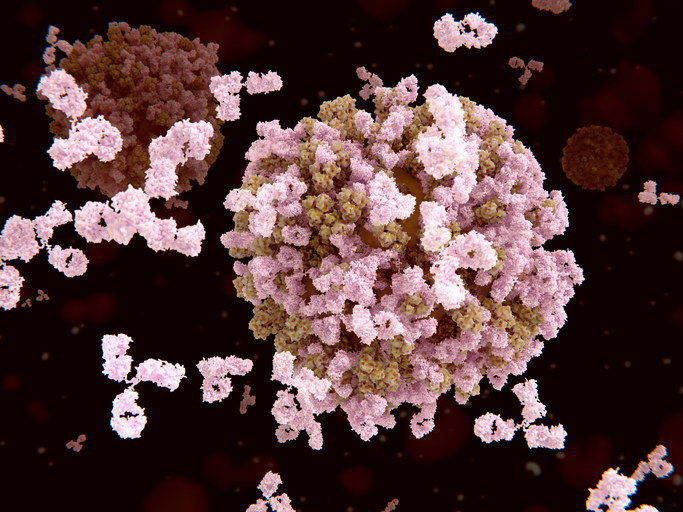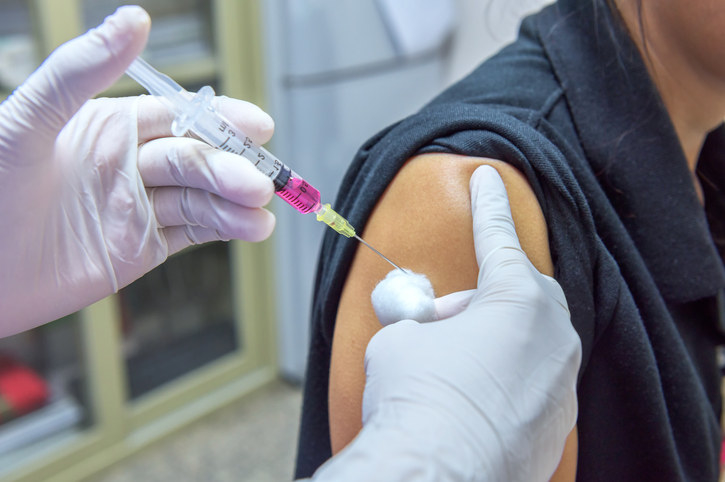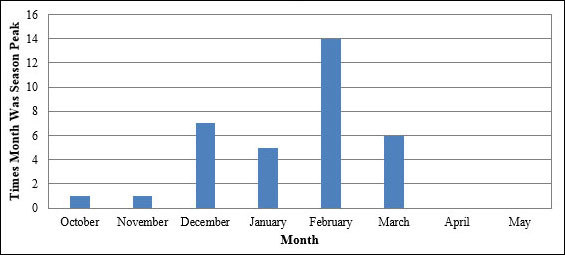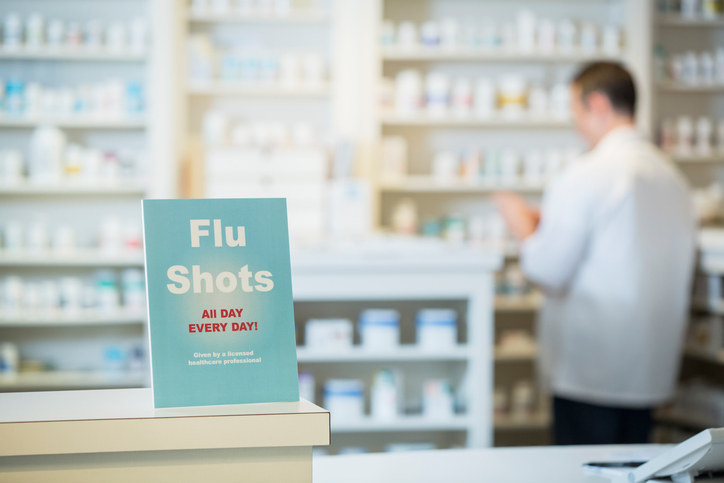As flu season kicks off in the US, you may be wondering if you should get the flu shot. The short answer is yes.
The flu is a contagious respiratory illness caused by influenza viruses that usually cause a fever, chills, sore throat, runny nose, and muscle aches. It is not the same as the common cold and is usually more dangerous, but they can have similar symptoms. If you've ever had the flu, you know that it can be absolutely miserable, knocking you out for days or even weeks.
In the US, flu season generally runs from October to March. Now that it’s October, you may be considering the flu shot, and you might have a few questions about it. Do I actually need it? What if I just ride it out? My friends aren’t getting it, so why should I?
These are all valid questions, and with all the misconceptions and myths surrounding the flu shot, it’s no wonder why you have them. In order to clear those up and explain what you need to know, we spoke to Daniel Eiras, MD, assistant professor of infectious diseases at NYU Langone Health, and consulted the most recent vaccination guidelines for the 2017-2018 flu season from the Centers for Disease Control and Prevention (CDC). Here are some answers.
1. The flu vaccine is the best way to prevent yourself from getting sick and from spreading the flu to others.

"It's spread through respiratory secretions, so from things like coughing or sneezing, which then make their way into someone else's mouth or get on a shared surface," Eiras tells BuzzFeed Health. Here's an example of how transmission occurs: Someone sneezes into their hands then shakes your hand shortly after, and then you touch your mouth while eating. That’s all it takes. The flu is easily spread in enclosed spaces with many people, Eiras says. Schools and offices are hot spots for transmission.
It's simple: if you don't want to get the flu (or if you get it, to at least lessen its severity), get the flu shot. The more people get vaccinated, the less flu can spread among a community. Sure, the vaccine’s effectiveness can vary and isn't 100% (we'll get to that more in a bit!), but recent CDC studies estimate that the vaccine can reduce the risk of the flu in the overall population by 40–60%, which is a substantial amount. It’s recommended that everyone over 6 months old get the flu shot, except for people with a documented allergy to an ingredient in the vaccine, says Eiras. (We’ll also get into that in a bit.)
Use the CDC’s Flu Vaccine Finder to find out which pharmacies and clinics are offering the shot in your area.
2. More importantly, the flu shot saves lives and keeps people out of the hospital — because the flu can be deadly.

"Most people do not realize that this is a very, very widespread and lethal infection, and it can be devastating for many families," Eiras says. The CDC estimates that since 2010, there have been between 140,000 and 710,000 flu-related hospitalizations and 12,000 to 56,000 flu-related deaths.
"It usually kills you in one of two ways — either the virus alone overwhelms the lungs and causes a viral pneumonia, or it puts you at risk for developing a secondary or bacterial pneumonia that kills you," Eiras says. Some people are at higher risk for developing complications from the flu, such as the elderly, pregnant women, children, and people with chronic conditions like asthma and diabetes. But it’s not only these groups that are susceptible — the flu can kill healthy adults, too. And that's actually what happened with the influenza pandemic of 1918 (pictured above), which infected nearly 500 million people and killed an estimated 40 million worldwide.
3. The shot gives you a killed version of the flu so your immune system can make antibodies that attack the actual virus.

"It uses the person's immune response to protect them from infection," Eiras says. So basically, the flu shot exposes your body to an inactivated (or non-infectious) version of the virus so your body can develop protective antibodies without you having to battle the actual flu. "All versions of the flu shot are now killed. We used to have a spray with a live, attenuated (weakened) version of the virus, but it has been phased out," says Eiras. The killed version has been shown to be very safe, he says, which is why it’s safe for people who are immunosuppressed, such as cancer patients or those with HIV.
4. And no, you will NOT get the flu from a flu shot, but the side effects can make you feel crummy for a day or two.
Since the virus is completely killed, you cannot get the flu from the flu shot — this is a total myth, Eiras says. You may feel a little sick or get a runny nose after you get the shot, but these are only side effects, and these symptoms are usually mild and short-lived compared to those from the actual flu.
"If you do have that systemic response and feel crummy or feverish after the shot, a lot of that isn't you being sick but rather, the body responding to the vaccine and your immune system revving up to make antibodies," Eiras says. So if you do feel sick after you get your shot, take it as a sign that your body is putting in work.
5. There are several different types of flu vaccines available, and the one you get will depend on your age and individual health.

The flu vaccine is either trivalent, meaning it protects against three strains of the virus, or quadrivalent, meaning it protects against four. These usually include two influenza A viruses, such as H1N1 and H3N2, and one to two influenza B viruses, which are grown in chicken eggs. "In terms of immune response, there isn't a huge difference in the two, which is why both are available," Eiras says. Both the trivalent or quadrivalent vaccines are safe for most people, but you may require a special version depending on your age, health, and medical history.
In addition to the standard-dose flu shots, there are high-dose shots, recombinant shots, and shots made with an adjuvant. The high-dose shot (Fluzone) is meant for people over 65, and it triggers a stronger immune response, Eiras says, since older adults produce fewer antibodies. The recombinant shot (Flubok) is egg-free, so it's meant for people with severe egg allergies. And the shot with adjuvant (FLUAD) has an immune-boosting supplement; it's meant for people with weaker immune systems who need a little help making antibodies.
6. It is safe for pregnant women to get the flu vaccine, and it can also protect the baby from getting the flu after birth.

The CDC recommends that pregnant women get the flu shot during any trimester since they are more susceptible to developing a severe illness from the flu than women who aren’t pregnant.
Additionally, the flu shot can provide extra protection for the newborn baby. During pregnancy, mothers pass the antibodies to the baby, and that can protect them during the first few months after birth. Any of the trivalent or quadrivalent shots are safe for pregnant women, but you should always consult your doctor first to decide which one is right for you depending on your individual health and allergies.
7. We need it every year because the flu shot doesn't give us lasting immunity, and the virus mutates frequently.
Unlike vaccines for other illnesses such as mumps or whooping cough, the vaccine for seasonal influenza doesn't provide you with immunity for years. That's why it's called the "seasonal" influenza vaccine. "Our immunity to the flu kind of wanes and goes away pretty quickly, so you're only protected for about a few months to a year," Eiras says.
Another reason we need a new vaccine each year is because the flu is constantly mutating and changing, so there are different prevailing strains each year. "You hear of things like H1N1, H3N2, H5N1 — these are all terms for different strains, which can infect people depending on the year and the flu season," Eiras says. The CDC recommends that everyone age 6 months and older get vaccinated annually.
8. The strains in the vaccine are based on an estimation, so sometimes they won’t be a perfect match with the strains that end up circulating — the shot still provides protection, though.

"The strains included in the flu vaccine are based on a complicated algorithm which the CDC plays a large role in,” Eiras says. It takes surveillance data for strains infecting people in other parts of the world (such as China and South Asia) at the beginning of the year, and uses that data to predict which strains will circulate later in the year during flu season in the US. That being said, this estimate isn't always perfect and sometimes the strains in the vaccine aren't a perfect match for the ones that pop up during flu season, which can reduce the vaccine's effectiveness.
The flu also mutates rapidly, Eiras says, which means that during those six months between the time scientists make a prediction and when the flu shot is ready, the prevailing strain might change. The good news is that even if the vaccine misses one strain, it’ll still protect against the two to three other ones. Additionally, the antibodies your body makes in response to the flu shot can sometimes protect against other, different strains — this is called cross-protection — and it’s another way that the vaccine can reduce flu-related complications.
9. That's one of the reasons you can still get the flu (even if it’s a less severe infection) after you’ve gotten the shot.

There are typically two reasons you'd get the flu after you get the vaccine. The first is that the prevailing strains don't exactly match the ones in the vaccine, like we mentioned previously. "If you get the shot and become infected with a different strain, you'll probably have a less severe course because your body has been exposed to similar flu particles and your immune system is already stronger," Eiras says.
You might also get the flu because you were exposed to the virus right before you got the shot, Eiras says. According to the CDC, the incubation period for the flu can last one to four days, so you might not have any symptoms at all for a solid week after being infected. In this case, the shot won't really help or lessen the severity of the flu, but it can still provide protection against other strains that could pop up later on.
10. Once you get the shot it’ll take about two weeks for your body to develop antibodies, so you aren't immediately protected.

"People forget that it takes anywhere from two weeks to a month for your immune system to kick in and make antibodies so you're protected from the flu," Eiras says. That means you’re still susceptible to getting the flu immediately after getting the shot if you’re around people who have it. This is also why it's crucial to get vaccinated early, so that you're protected before the height of flu season.
11. Flu season in the US typically peaks in February, but it can start as early as October, so you should get your shot soon.

"The flu actually infects people all the time, all over the world, and there are hundreds of types of flu — but the transmission is much higher in the Northern hemisphere during the winter months," Eiras says. That means you should ideally get the shot between October and November. But since the cases can pop up as late as May, you can still get your shot in January or February. Better late than never, right?
"It's also better to get it when the flu shot is widely available at pharmacies and outpatient offices, because later in the flu season when infections are rampant, these places can get overwhelmed and may be low in stock," Eiras says. So if you're reading this and you live in the US, now is a perfect time! The CDC recommends that people get it before the end of October. The cost of your flu shot depends on which one you get and whether your insurance covers it.
12. There are some serious reactions to the flu shot, but these are very rare.

Side effects are always possible with the flu vaccine. These include localized redness at the injection site, headache, nausea, muscle aches, and fever. But they are generally mild and will go away in a few days. "Very rarely, people can have a severe allergic reaction to another ingredient aside from egg that's used in the vaccine (such as gelatin), which can be life-threatening," Eiras says.
If you have a severe allergy to a vaccine component or you are unsure, talk to your doctor — you may not be able to get the flu vaccine or need to get it under medical supervision. And remember, most reactions to the flu shot are not evidence of an allergic reaction, says Eiras. They are just normal side effects.
There is also some evidence that there might be a small association between the flu vaccine and Guillain-Barré syndrome (GBS), says Eiras, which is a rare disorder that causes the immune system to attack nerve cells. "This is also very rare, and GBS is associated with a variety of other infections as well, so we aren't 100% sure how this happens in relation to the vaccine." If you’ve had GBS, talk to your doctor before getting a shot. If you haven’t, don’t worry. Compared to the known benefits of the flu vaccine, these risks are rare enough that they shouldn’t deter any healthy person from getting the flu shot.
13. It isn't better to just get the flu and ride it out, because then you put others around you at risk.

You may be thinking, “Well, if I just get the flu and ride it out, then my body will develop antibodies and I'll have a better immune system at the end of it all.” This is another misconception — getting the flu is not better than getting a flu shot, Eiras says. And why get sick when you can achieve the same immune response from a shot? Not only can going unvaccinated put you at risk for developing a serious illness that knocks you out of work or school for weeks (or even lands you in the hospital), but going unvaccinated also puts other people at risk.
Some people cannot get the flu shot. That includes babies under 6 months old and people with a documented severe allergy to an ingredient in the flu vaccine, Eiras says. When you don't get the vaccine, you can spread the virus to these vulnerable people or put other people, like the elderly and the immunosuppressed, at higher risk for getting the flu and developing complications. Some people will refuse the flu shot for religious or moral reasons, says Eiras, but when most people get vaccinated, it benefits the entire population.
